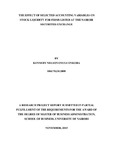| dc.contributor.author | Onkoba, Kennedy O | |
| dc.date.accessioned | 2013-11-27T13:06:54Z | |
| dc.date.available | 2013-11-27T13:06:54Z | |
| dc.date.issued | 2013 | |
| dc.identifier.citation | Degree of Master of Business Administration, | en |
| dc.identifier.uri | http://erepository.uonbi.ac.ke:8080/xmlui/handle/123456789/60731 | |
| dc.description.abstract | This study sought to investigate the effect of selected accounting variables on stock liquidity for firm’s listed at the Nairobi Securities Exchange. In particular the study examined the effect of debt to equity ration on stock liquidity, the effect of dividend yield on stock liquidity, the effect of asset turnover ratio on stock liquidity and the effect of earnings per share on stock liquidity for firms listed at the Nairobi Securities Exchange. The study was addressing the gap of whether the selected accounting variables had an effect on the stock liquidity and whether one can use them to predict the stock liquidity at the bourse. The study used a descriptive design model. The population of this study comprised of all the listed firms at the Nairobi Securities Exchange from January 2008 to December 2012. The sample constituted all the firms that comprise the NSE 20 Share Index. Analysis was conducted through the use of regression analysis and ANOVA. The results indicated that accounting variables, as represented by the predictor variables only influenced ten percent of variations in stock liquidity as indicated by the adjusted R square statistic. The model thus only explained a small proportion of the variations in stock liquidity. The study also found debt to equity ratio to have a positive and sizeable effect on stock liquidity. Thus a shift in debt to equity ratio influences a same direction shift of the stock liquidity; dividend yield to have a positive but lesser effect on stock liquidity. It was further inferred that the effect of dividend yield on stock liquidity was found to be half that of debt to equity ratio. Asset turnover ratio was found to have a negative and but slightly larger relationship with stock liquidity. This means that stocks shade off their liquidity with increase in the asset turnover and earnings per share were also found to have a negative relationship with stock liquidity. The ANOVA test of significance on the four predictor variables only found earnings per share to be of significance in predicating stock liquidity in the model. On the basis of the findings, the study recommends that of the selected accounting variables of firms in the Nairobi Securities Exchange only earnings per share can be reliably used as a basis for projecting stock liquidity variations of listed firms. It is therefore suggested that factors and accounting variables be studied to determine those that can be reliably used to predict stock liquidity variations at the Nairobi Securities Exchange | en |
| dc.language.iso | en | en |
| dc.publisher | University of Nairobi, | en |
| dc.title | The Effect of Selected Accounting Variables on Stock Liquidity for Firms Listed at the Nairobi Securities Exchange | en |
| dc.type | Thesis | en |
| local.publisher | School of Business, | en |

